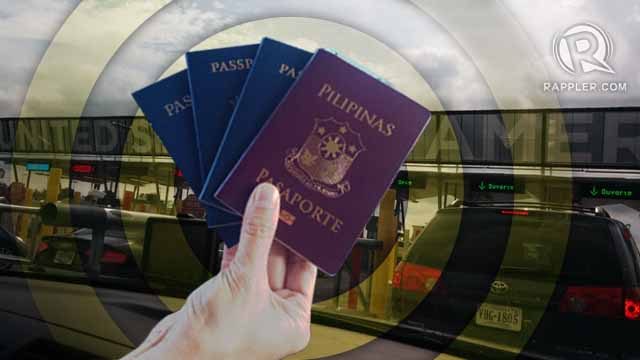SUMMARY
This is AI generated summarization, which may have errors. For context, always refer to the full article.
 To cross the border between New York and Canada during a recent vacation, our friends and I gathered our passports and handed them over to the immigration officer.
To cross the border between New York and Canada during a recent vacation, our friends and I gathered our passports and handed them over to the immigration officer.
We were celebrating our friend’s first trip outside the US after being in immigration limbo for 14 years. We teased her about her maroon passport from the Philippines, telling her that we would lose her green card or that they would determine it’s a fake. She laughed with us but was still nervous the way only an immigrant could be.
We were allowed to tease her as each of us had been in her shoes before. All born and raised in the Philippines, except for my wife who came as a tween, we had all moved to the US as young adults.
I was also under hostage by immigration bureaucracy for 8 years. I couldn’t exit the US before I obtained permanent residency in an expensive grueling process and via several backbreaking jobs. Even when I finally could, I would always be nervous and paranoid about it. I would clutch my passport and repeatedly check for my green card in a way that my wife could not understand. I would try to explain that with all the challenges and hardships I experienced to get to that stage, I was terrified about losing my proof that I was allowed back into the country where I had built my life with her.
Not as we are led to believe

From being interviewed at the US Embassy in Manila, to attempting to assimilate in the US, to jumping through immigration hurdles and keeping horrible jobs to maintain legal status, I’ve learned firsthand that the life of an overseas Pinoy is not as we are led to believe. Being an immigrant in a country where so many of my kababayans (countrymen) have taken root is actually not as easy as it seems. We just never hear our relatives whine about it, as they prefer to simply get on with their lives.
It’s hard to explain this to anyone who has never been in the situation of having to leave one’s country for the cliché of a better life. It’s also very easy to reduce the immigrant life to a matter of nationalism, accusing overseas Pinoys of abandoning their heritage and the struggles they face back home. The fact is that many of us make the decision to leave for reasons other than having lost love for the homeland. On the contrary, it’s often our love for the country and those we leave behind that force us to try our luck in other shores.
While away we try our best to make the most of the distance, make the most of ourselves, maximize our efforts, and stay out of trouble. A select few are lucky to maintain legal status in the US instead of spending their life as TNTs (undocumented immigrants).
Can you really blame those who do achieve permanent residency or US citizenship for the relief they feel obtaining the unattainable? Could you really take lightly that they have achieved what has been so out of reach?
Most powerful passport in the world
It is no secret that along with a UK passport, an American passport is considered the most powerful in the world, with 147 countries allowing its citizens visa-free entry. Having American citizenship or US permanent residency also entitles one to be employed in its various industries and obtain social services that are among the best worldwide.
Regardless of its own social and political issues, the US is still a coveted place to visit or to live in. This is why wealthy mothers (Filipinos and other Asians, especially) give birth here to assure their babies of American citizenship in case these children return to the US as adults.
After many years of waiting, tears of frustration, and great financial cost, I now have a blue passport, but I never shook off the fear. A decade of being in the mercy of immigration authorities has given me a kind of post-traumatic stress disorder (PTSD). Despite its diversity, being a person of color in this country is still and will always be followed by the question, “Where are you from?”
For over a decade I’ve always felt on the defensive, always ready to be interrogated and asked where I was going or what I was doing or what I brought with me. And although I have the paperwork to show I have the right to be here, my heritage and history often make me feel like I shouldn’t, especially with the animosity many Americans have towards immigrants and people of color like me.
Traveling and crossing a land border with a Filipino citizen last week reminded me of the time when I was in her shoes, hanging on to my green card like I would be incarcerated if I lost it and be sent on a quick flight home. I remembered always fearing that everything I worked for and struggled with on a daily basis would all boil down into whether I had the right paperwork or if a person of authority didn’t fancy my face.
Lessons in displacement
Before I left the Philippines to follow my heart, I was among the idealistic young ones who promised that I would never leave my homeland, only for these principles to be tested and broken by love. I have learned that it’s easy to judge others for their decision to leave the Philippines from one’s corner where they belong, where everything is familiar, and where they can coast and survive. I was one of them until I had to be on the other side.
Having displaced myself and forced myself to assimilate into the US, I’ve constantly had to prove my worth as a person and as an employee, as well as show that my education, skills, and dedication are at par with those born on this soil. It has been a long struggle for me and my loved ones, and it’s only recently that I’ve actually become comfortable about my place in this foreign land.
Allow me and those like me to hang on tightly to our travel documents sometimes, even just to feel that if only for a piece of paper, nothing can be taken away from me, I have the same privileges as the person next to me, and that I have a right to be here. – Rappler.com
Add a comment
How does this make you feel?
There are no comments yet. Add your comment to start the conversation.